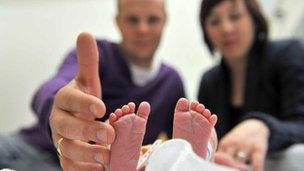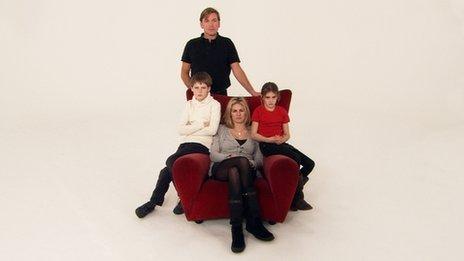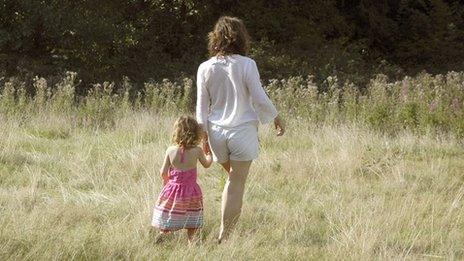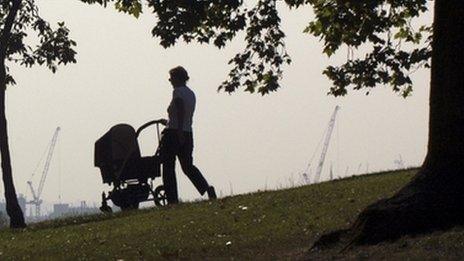Child benefit changes 'seriously flawed' accountants say
- Published

Child benefit payments to parents are changing from January 2013
Planned changes to child benefit are flawed and risk being an "operational disaster", accountants say.
Ministers say lower earners should not be subsidising those on higher incomes.
So from January homes where one parent earns more than £50,000 will have their child benefit reduced.
The Institute of Chartered Accountants in England and Wales says it undermines the principle of individual taxation as it involves clawing back from one person a benefit paid to another.
The ICAEW has sent a report to MPs and Treasury ministers raising its concerns.
Changes to the rules on child benefit come into force in January and are set to reduce the entitlement of more than a million families.
Families where one parent is earning more than £50,000 a year will no longer be able to claim the total amount of child benefit.
How these rules are put into action is still being worked out by the UK tax authority.
However, this will include an expectation of couples to disclose to each other whether they claim child benefit, or earn above £50,000 a year.
The amount received will be withdrawn gradually as one parent's income rises above £50,000, with the child benefit being eroded completely once someone's income is £60,000 or more.
If one of the parents earns more than £60,000, they may choose to stop claiming child benefit and save the tax authority the trouble of getting it back. But if they keep claiming it, then they will have to declare this in a self-assessment tax form.
'Confidence undermined'
The ICAEW lists a whole range of potential problems with the current plans, from possible breaches in confidentiality to the prospect of making half a million more people fill in self-assessment forms than currently have to.
According to the Daily Telegraph, it said:, external "Families in similar financial situations could be treated quite differently, undermining the policy's fairness objective and creating very high marginal rates of tax for some.
"Taxpayers could find their tax confidentiality breached and experience lower service standards while grappling with an even more complicated system. Their confidence in HMRC and the tax system will be undermined and there will be behaviour changes and planning to avoid the charge."
Labour's Rachel Reeves said the legislation was a "complete mess".
The shadow chief secretary to the Treasury said: "Ever since George Osborne announced this policy for a quick headline at the Conservative Party conference he has ignored warnings that it was not just unfair but simply unworkable."
She said Labour believes "in the principle of universal child benefit" and had voted against the changes, although the party has not committed to reversing them if it gets into government.
The BBC's political correspondent Gary O'Donoghue says the criticisms from a highly respected body could re-open the argument surrounding the issue of child benefit just six months before the changes are due to come in.
- Published26 April 2012

- Published22 September 2014

- Published14 March 2012
